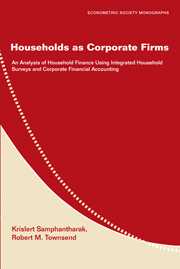 Households as Corporate Firms
Households as Corporate Firms Published online by Cambridge University Press: 05 January 2013
We discussed in chapter 2 that we can view a household as a corporate firm. We also presented the standard corporate financial accounts and argued for the advantages of creating and using the accounts for the analysis of financial situations and behaviors of the households. However, there are some characteristics that make the household and the firm different. The objectives of the studies of household and firm behavior are also not identical. Several transactions are also unique to the households in developing countries. Therefore, some modifications of the financial accounts are needed. This chapter highlights some of the important issues where special attention is needed.
As mentioned earlier, the principle contribution of this monograph is the conceptualization of the accounts. We do this in order to avoid ambiguous and mis-measured variables that would otherwise contaminate subsequent analysis. This necessitates some difficult decisions on how to deal with some unusual transactions. When we make an arbitrary decision from several possibilities, we discuss the reasons why we prefer our method as compared to possible alternatives. We use the Townsend Thai Monthly Survey discussed in chapter 3 as our illustrative survey to address these issues although the discussion in this chapter is largely applied to other household surveys in developing countries as well.
TANGIBLE ASSETS, LIABILITIES AND WEALTH
To construct a balance sheet for each household, we need information on tangible assets and liabilities.
To save this book to your Kindle, first ensure no-reply@cambridge.org is added to your Approved Personal Document E-mail List under your Personal Document Settings on the Manage Your Content and Devices page of your Amazon account. Then enter the ‘name’ part of your Kindle email address below. Find out more about saving to your Kindle.
Note you can select to save to either the @free.kindle.com or @kindle.com variations. ‘@free.kindle.com’ emails are free but can only be saved to your device when it is connected to wi-fi. ‘@kindle.com’ emails can be delivered even when you are not connected to wi-fi, but note that service fees apply.
Find out more about the Kindle Personal Document Service.
To save content items to your account, please confirm that you agree to abide by our usage policies. If this is the first time you use this feature, you will be asked to authorise Cambridge Core to connect with your account. Find out more about saving content to Dropbox.
To save content items to your account, please confirm that you agree to abide by our usage policies. If this is the first time you use this feature, you will be asked to authorise Cambridge Core to connect with your account. Find out more about saving content to Google Drive.